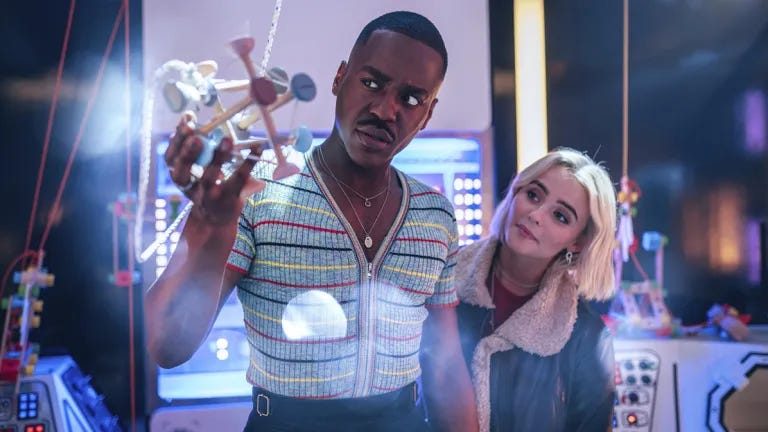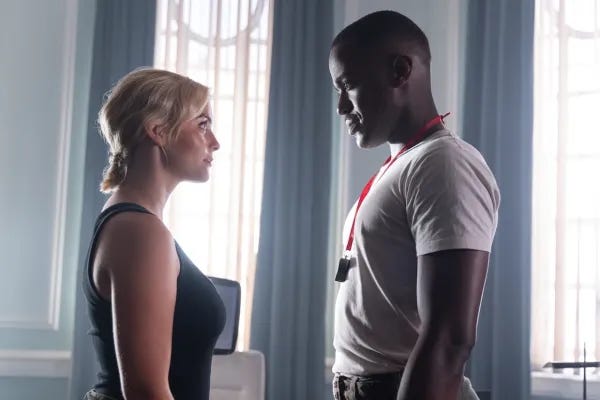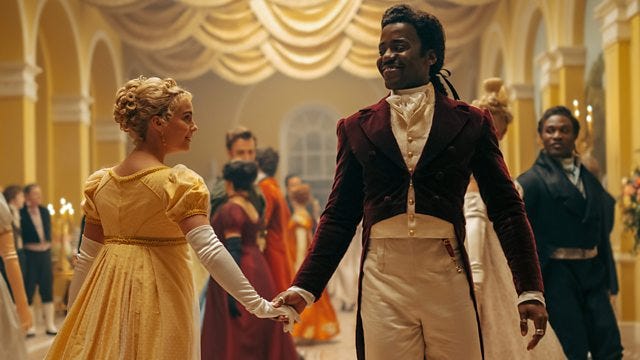Doctor Who series 14 review
Ncuti Gatwa proves to be a worthy successor to the sonic screwdriver, but can Russell T Davies match the heights of his last tenure as showrunner? (So far: no.)
Series 14 of Doctor Who has been rebranded as Season One. To make the divide between the new stuff and the old stuff even clearer, the new Russell T Davies (RTD) episodes get their own shiny page on iPlayer, as if socially distancing themselves in the belief that Chris Chibnall’s poor critical reception is contagious.
Boosted by the casting of Ncuti Gatwa as the Doctor and an expanded budget courtesy of Disney, this series is supposed to mark a fresh start to win back old viewers who tuned out and, more importantly, attract new viewers that the BBC is hoping to reach through its distribution deal with Mr Mouse.
Has this relaunch been successful in these aims? In simple terms, no. There have been moments of brilliance, but structural issues abound.
Issue #1: The first two episodes
Why oh why did RTD decide that the best episode to introduce new and returning viewers to the show should be Space Babies ????

This is by no means the worst episode of Who ever written, but it's certainly too weird and underdeveloped to serve as series opener. Half of the episode is an exposition dump, the other half is a confused albeit sweet story about prematurely developed babies lost in space. As mid-series filler, it would be acceptable. As the first episode aiming to sell the series to international viewers, it's hopeless.
One wonders if it was a bad idea to bring back RTD to resurrect the show. The man is not out of interesting ideas yet, as later episodes Dot and Bubble and 73 Yards show. Both of these stories had their own problems, but they were suspenseful and interesting, something Space Babies is not. Ncuti’s attempts to give life to the exposition - TARDIS, perception filter, automatic translation etc etc - are useless when the script has set them out in the dullest way possible. I got the impression that RTD, who'd already laid out his ideal intro to the Doctor in his first 2005 episode, was racing through all this boring introductory stuff he's written already, impatient to script stuff he’s more passionate about.
Equally poor at establishing the show for new viewers is the second story, The Devil’s Chord, a fourth wall-breaking episode full of experimental ideas that ultimately falls flat, despite Jinkx Monsoon’s best efforts. There is also a strange amount of repetition between this and Space Babies, with the Doctor is forced to run away both times because of the scale of villainy afoot. There’s nothing wrong with the Doctor running away, but the essence of his character is the all-powerful gung-ho Time Lord. Having him forced onto the back foot so ruthlessly in the opening 2 episodes feels like a bad step in establishing the series.
Issue #2: Structural failures
These openers feel all the more strange given that there has been a sort of formula for starting your series of Doctor Who and introducing a new companion. With the companion as the audience surrogate, it makes sense to start with a small-scale story that throw the Doctor and the companion together (eg Rose, Smith and Jones, The Eleventh Hour), before episode 2 sets up a great adventure in outer space and/or a significant, very recognisable time period in history to demonstrate the Doctor’s power and the scale of his universe to the companion and the viewer (eg The End of the World, The Fires of Pompeii). Later in the series, when you’ve got the audience settled down and they are invested in the Doctor/companion relationship, is when you throw in the experimental stuff, your Human Natures and your Turn Lefts.
It would have made better sense to push Rogue up the running order in Series 14. This fun adventure set in the Regency era, with silly aliens and a little romance between the Doctor and Jonathan Groff, is surely a much more appealing sell to audiences new and old than shitting Space Babies!!!
At only 8 episodes, the series barely gets time to get going after this initial fumbling. Apparently, due to budget and time constraints we either get 8 episodes a year or 13 every 2 years - I personally would rather the latter given how this season played out.
The sense of the ending coming far too quickly is not at all helped by the fact that 2 episodes, 73 Yards and Dot and Bubble are 'Doctor-lite', barely featuring Fifteen due to Ncuti having to finish filming Sex Education at the same time as production on Who was beginning. Ncuti's natural charisma does a lot to carry the Doctor’s character, but the epic conclusion in Empire of Death relies on us caring about the relationship between Ruby and the Doctor when we haven't actually spent that much time with them together. The grandiose goodbye between the pair at the series’ end feels unearned, not least because Season Two has already finished filming and they have confirmed that Ruby will come back.
Issue #3: Ruby, the underdeveloped companion
Ruby grew on me as a companion throughout the series. Letting her stand on her own in 73 Yards gave Millie Gibson a chance to shine, but I still feel her character is somewhat underdeveloped compared to other RTD iterations. One fantastic thing about the first RTD run was that the companions all had their own lives and families parallel to the Doctor, and these became integral parts of the plot. Who could forget Jackie "I’m in my dressing gown" Tyler, or Donna’s beloved grandpa, Wilf? Episodes set on contemporary Earth (eg Aliens of London, The Lazarus Experiment, The Sontaran Stratagem) put the companions’ families in real danger and explored nuanced conflicts concerning the real impact travelling with the Doctor has on relations back home.
Establishing the companion’s life before the Doctor gives their character dimension and makes their relationships with the Doctor more interesting. It is clear from the beginning that Rose and Donna, for example, are uninspired by their humdrum suburban lives and that the Doctor offers them a magical opportunity for escape. They were both also strong personalities capable of challenging the Doctor’s beliefs for the better- who could forget Donna demanding he save the innocent people from the fires of Pompeii? Or Rose connecting with the working class across the galaxy, from Victorian maids to outer space Ood? Ruby isn’t given a clear motivation to travel with the Doctor. In the Christmas special, we see her play keyboard in a band and laughing with some friends who remain faceless. Of course she wants to go travelling with the Doctor - who wouldn’t - but what is the life she’s leaving behind?
What we know about Ruby is mainly what we don't know, who her parents are. A foundling, when we meet her in the Xmas special she is chatting to Davina McCall in the hope of tracking down her birth mother. Her relationship to her foster mother and grandmother are loving, but these relationships are superficially drawn. Ruby's desire to connect with her birth mother, the principal mystery of the series, doesn’t even seem to be that urgent. When the Doctor tells her the one place he can’t take her is to the church on Ruby Road on Christmas Eve 2004, she accepts this without protest, as indeed she accepts most things the Doctor does. Their dynamic is charming and affectionate, but it’s unclear what really binds them together other than a shared sense of energy. The only time Ruby disobeys the Doctor is in the final episode where she strides into the café to meet her birth mother, and it would have been great to see more back and forth between the two rather than constant chatter about them being ‘best friends’ like giggling Year 5s.

The ‘who is Ruby's mother’ plot could have been a lot worse. I personally was relieved that it ended with her being nothing more than a stressed normal teen mum. Clearly RTD watched the Star Wars sequels and thought, "oooh, I could do that better!" If Ruby had been revealed to be the Master’s daughter or the Doctor’s great granddaughter or something else silly that would have completely ruined the purpose of the companion character, who is meant to represent the ordinariness of the audience.
Irritatingly though, as with Donna in Journey’s End, the companion saves the day but only through the conceit of the plot. It is Ruby's circumstances not her actions that ultimately save the world from Sutekh and that feels like a disappointment. Additionally, while I was pleased that Ruby’s mother was a nobody, it feels like a rather sly writing trick to have this fifteen year old running around in the snow in a sinister cape (in 2004?), dramatically pointing at things in the manner of a wizard. The visual language used to depict Ruby’s mother was dishonest, telling us one thing then flipping the rug to reiterate RTD’s favourite Who message about the importance of ordinary people.
Issue #4: Russell T Davies
Is it time to put RTD, Doctor Who showrunner, out to pasture? They’ve already filmed Season Two/Series 15, so whatever critical feedback he might have heeded on this series certainly won’t be listened to.
The final 2-parter exposed all the flaws in RTD’s writing style, which recurred in other episodes he scripted this series. In Empire of Death, everything goes into the script, the kitchen sink, last night’s leftovers, the compost bin, it’s Sutekh, it’s classic Who references, it’s the end of the universe, everyone’s dead - except they aren’t, because the death of Sutekh, bringer of death, brings life? … OK.
RTD’s finales are always scrappy like this, but 73 Yards, which had a stellar first 30 minutes, also suddenly falls apart in the final 15 as older Ruby goes around undoing her new timeline without explaining how or why. It was a great idea that failed to stick the landing.
Having read The Writer’s Tale, a book of emails exchanged between RTD and journalist Benjamin Cook while RTD was writing Series 4, it’s pretty clear why RTD always has these big ideas with botched conclusions: his writing process is horrendous. When writing big moments such as Rose’s return in Turn Left, he was scrabbling away at 3am on a keyboard struggling to meet a deadline that had already passed. He’s a chronic procrastinator, preferring to sit and think and then only write when it’s already far too late. Because of this, his scripts aren’t often revised, but in the past his natural talents are such that even this chaotic process can produce all-time Who classics such as Gridlock, Utopia etc.
Hailed as the saviour to revive Who after years of diminishing returns, I’m not sure if bringing RTD back was the best choice. The show needs fresh voices and fresh talent - only two episodes this series were written by writers other than RTD, and one of those is another former showrunner, Steven Moffat! I understand the reaction to Chibnall spooked the BBC, and the return of RTD, who revived the show so successfully in 2005, seemed like a good idea, but to relaunch the show for a new generation I believe it needs completely fresh eyes.
And by fresh eyes, I mean mine. BBC/Disney - hire me. Like any critic, I think I could do it better! Except, I don’t think I could really. Doctor Who is a really difficult show to write, with an unparalleled generational reach and a sixty-year legacy to upload. In the streaming era, its premise looks especially shaky as eight episode ongoing arcs emerge as TV standard, rather than longer sequences of self-contained storylines. Series 14 was clearly fighting with these trends, desiring to keep the Who format intact while also introducing over-arching mysteries (who is Ruby’s mother? Or Mrs Flood?) that strive to keep people engaged when they could be watching ASMR videos of cats eating raspberries on TikTok.
Viewing figures for this series, even accounting for iPlayer and streaming, are currently hovering around 4 million in the UK. By contrast, last year’s series of Happy Valley, a huge BBC hit, had 8 million viewers an episode on average. 4 million viewers is respectable, but for as staple Saturday night show with Disney investment, BBC executives were probably hoping for more. Season 2/series 15 is already on its way regardless. Time will have to tell whether RTD’s new take on the Time Lord will have legs beyond 2025.





Interesting piece Elsie. What about the football coverage?